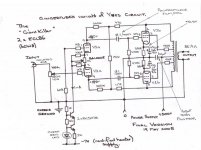Feel like a fool,
Was probing voltages in my amp and I accidently swiped the probe across pin 2 and pin 3 causing a short and a serious amount of hum.
The hum remains! That channel is now just giving me a little music and a lot of hum, I hope i have not damaged the transformer.
I am aware that I have shorted the screen of the pentode to the cathode of the triode which is fed by ccs....
Can anyone shine some light on what I have done?
S
Was probing voltages in my amp and I accidently swiped the probe across pin 2 and pin 3 causing a short and a serious amount of hum.
The hum remains! That channel is now just giving me a little music and a lot of hum, I hope i have not damaged the transformer.
I am aware that I have shorted the screen of the pentode to the cathode of the triode which is fed by ccs....
Can anyone shine some light on what I have done?
S
Attachments
Check the DC voltages on the current sink. Is the LED lit ? You should have around 1.2 volts across the 1K. The semiconductors are the parts most likely to have been damaged.
Edit... voltage across the lower 1K that goes to the emitter
Edit... voltage across the lower 1K that goes to the emitter
So, I have just measured the voltage at pin 2 (with a crocodile clip!!) where the CCS meets the cathode and it is 9V on the side that i shorted.
It is 4 V on the otherside of the pair (same channel)
This was always 1.5 V on each side of the diff amp pair...
Could I have blown a transistor in the CCS supply?
S
It is 4 V on the otherside of the pair (same channel)
This was always 1.5 V on each side of the diff amp pair...
Could I have blown a transistor in the CCS supply?
S
Thanks Mooly, the other channel appears unharmed
I will swap the CCS over and see if it works, then I guess I will know that it is the CCS supply that has blown!!
S
I will swap the CCS over and see if it works, then I guess I will know that it is the CCS supply that has blown!!
S
All the evidence will be there in the voltage readings but yes, you have probably zapped one of both transistors.
Yep, channel workes fine now that i have swapped the CCS supply over from the other channel.... yes both LED's are lit.... I will go buy another pair of transistors!h
Unbelievable!! So I ran up my electronics store and bought 2 new bc547b's for the CCS. Spent a good deal of time undoing my work and finally replaced them, only to find that I still had a problem... it turned out the short had wiped out my 220R pot that I used to adjust the CCS delivery to the two tridoes...
Am learning never to assume, I should have checked the voltage all the way back to the CCS!
Getting there slowly...
S
Am learning never to assume, I should have checked the voltage all the way back to the CCS!
Getting there slowly...
S
I HIGHLY recommend checking all the resistors ... the 470Rs, etc.
Dumping the HV into the cathode leg can short 'em all out.
They're probably film, and I've found that unlike "old fashioned" bulk-body carbon composition types (which with overvoltage would rapidly heat, then bubble'n'stink), films just quietly (and invisibly) go "pop".
There very likely isn't any damage to transformers. They're hunks of iron, not whispers of silicon and hair-thin wires. Hunks, I tell you. Hunks.
GoatGuy
Dumping the HV into the cathode leg can short 'em all out.
They're probably film, and I've found that unlike "old fashioned" bulk-body carbon composition types (which with overvoltage would rapidly heat, then bubble'n'stink), films just quietly (and invisibly) go "pop".
There very likely isn't any damage to transformers. They're hunks of iron, not whispers of silicon and hair-thin wires. Hunks, I tell you. Hunks.
GoatGuy
They're hunks of iron, not whispers of silicon and hair-thin wires. Hunks, I tell you. Hunks.
😀 Yeah... The silicon will die before the iron.
~Tom
- Status
- Not open for further replies.
- Home
- Amplifiers
- Tubes / Valves
- Accident - Shorted Cathode to grid!!
